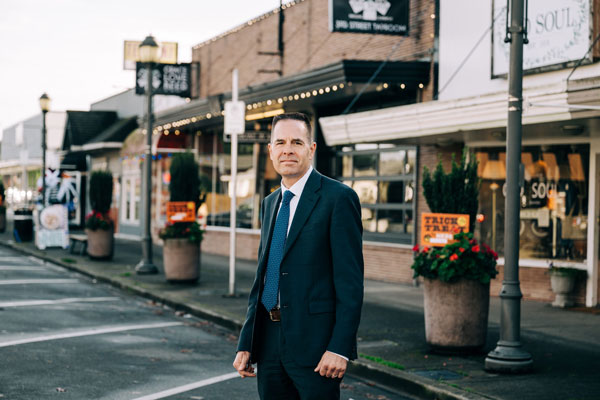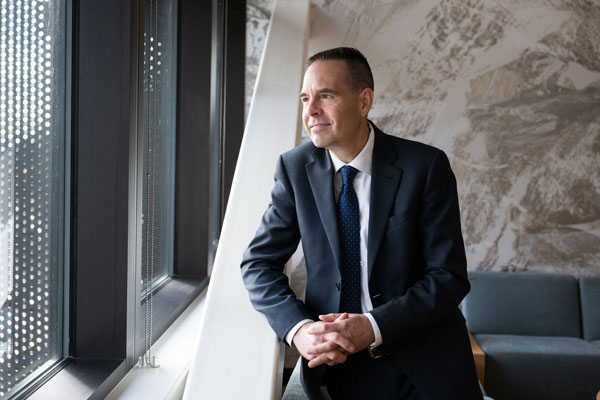AWC board secretary and Marysville Mayor Jon Nehring on the importance of building — and keeping — strong partnerships at the state and local levels.
By Jennifer Krazit

Marysville Mayor Jon Nehring on Third Street in the heart of the city’s business district. (Photo by Chona Kasinger)
You have strong ties to Marysville. How long have you lived in the area?
I’ve lived in Snohomish County almost my entire life. My wife, Mari-Anne, and I have lived in Marysville for over 31 years, and our three kids were all born and raised in Marysville. They’re all grown and out on their own now.
You worked in the business world before becoming an elected official. What inspired you to run for public office?
I’ve always been fascinated with politics. I was on the student senate in college. But my degree was in business. I got good jobs in advertising and the paper products industry, and I worked my way up from sales into management and executive positions. But I always had in the back of my mind that I would love to do public office at some point. So when a city council member I knew was retiring, she encouraged me to run for her spot, and I did. That was in 2001. Then about three years into my council tenure, I realized I still had that dream of doing this full-time. So when the mayor at that time retired, I went for it.
You joined the AWC board in 2013 and recently moved into the secretary role. What do you think is so important about the work AWC does?
AWC is about advocacy, education, and networking. If every city was left to advocate for themselves, they’d really get lost in the ocean in Olympia. When we unify around legislative priorities, we can go all-in on it. That presents a strong force in Olympia, and you can’t ignore that as a legislator or as a governor. There’s also education. When you’re a brand-new elected official, you’re really drinking from the fire hose. The association provides excellent education, not just in the intangibles, but in the tangibles, like what happens with your executive session or what the Public Records Act means to you. Those kinds of things save people a lot of headaches as new elected officials. Thirdly, AWC conferences are valuable for networking and for gaining the ability to work across the state and party lines in Olympia.
You have a reputation as a great collaborator. Why is it so important to build partnerships with local stakeholders and state legislators?
One of the untold stories of elected leadership is how much you can get done with solid coalitions and partnerships, and when you’re not overly worried about who gets the credit. We just had a ribbon cutting celebrating the completion of a 20-year project to widen our main thoroughfare from three to five lanes. We had the state and other partners there, and we would have never been able to do that on our own, never. Part of partnerships is forming them on the front end with relationships and trust, and then on the back end, making sure you recognize those folks when you’re cutting ribbons.
One of the untold stories of elected leadership is how much you can get done with solid coalitions and partnerships.
How does accountability factor into your philosophy of partnership-building?
You’ve got to be committed to the projects you partner on. When the City of Marysville has a project on the legislative agenda, we usually go back year after year for bits of funding, and we don’t stop until the project is fully funded and complete. We’ve built a reputation that if our state or federal partners invest money in a project, they can count on the fact that it’s not going to be a bridge to nowhere that never gets completed. Keeping the trust of your partners is critical. That means being honest with folks when things are going rough. We’ve had times where projects hit bumps in the road and we’ve given money back so it could be used in a better area.
You and the mayor of Everett co-lead an organization focused on public safety. How does that coalition work together?
The Mayors and Business Leaders for Public Safety works to find areas of common interest and collaboration around the issue of public safety. It came to be after the Blake decision, which essentially legalized drugs across the state, and then a law that prevents officers from pursuing [fleeing suspects]. We found crime skyrocketing. So we formed this group to tell our story in Olympia. We form small working groups with Snohomish County legislators from both sides of the aisle. We present them with issues we’re facing on the local level, and they can run a bill for us. We were able to get some fixes to the Blake decision and the pursuit bill. This year, we’re working heavily on juvenile crime, unlawful possession of firearms, and other issues.

Mayor Nehring at Marysville’s city hall. (Photo by Chona Kasinger)
How has collaboration improved in your time as mayor?
Our county didn’t used to collaborate a whole lot. There was a big divide between South Snohomish County and North Snohomish County. The bulk of the resources were going into South County, and we North County mayors kind-of felt left out. We realized that Snohomish County was too disjointed. Some of our state legislators said, “You guys come down with your own projects, and it makes it really hard for us to advocate for you.” Other counties would unite around a project list and everybody would be on board. And so, for the Connecting Washington transportation package in 2015, I worked with the North County mayors and the Economic Alliance Snohomish County to advocate for getting North County projects included. We went down with a unified list of Snohomish County projects, and our legislators made sure all of our projects were in there. That was a real success story. It showed us the power of one voice.